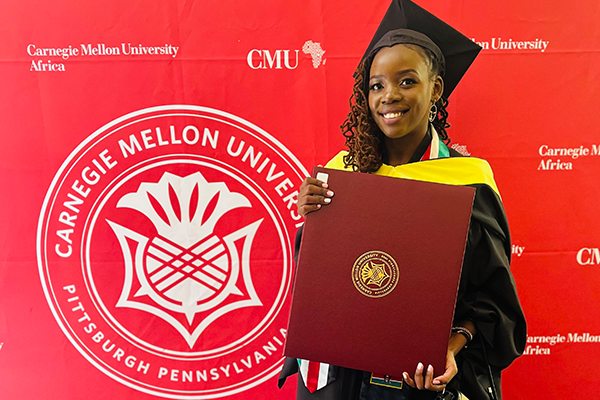Patents and passion: One alumna uses both to create social change
Giordana Verrengia
Feb 8, 2024
Before she decided that engineering would be her career path, Tanya Akumu knew one thing for certain—that whatever she chose would help her continue to understand how the world works. Akumu was most interested in exploring this idea with physical examples and processes, which led her to enroll in the electrical and electronic engineering program at Jomo Kenyatta University of Agriculture and Technology in Kenya. She completed her bachelor’s degree with the added distinction of Second Class Honors in the Upper Division.
Gaining experience beyond the classroom allowed Akumu to see ways of applying her technical skills to create social change. Akumu had her first internship at M-Kopa Solar Kenya, a company that works with the off-grid sector, making solar home systems for people without access to electricity. She worked at the company after completing her bachelor’s, transitioning to a full-time role first as a product test engineer and later, an embedded hardware engineer. During this time, Akumu continued to learn about herself and the kind of professional she wanted to be. She discovered that it was fulfilling to work for a cause that matters.
Making an impact is a really major part of who I am as a professional. My work has to encompass that.
Tanya Akumu, (MS ECE '21)
"Making an impact is a really major part of who I am as a professional. My work has to encompass that," she said. "So, when I heard about the CMU Engineering program and being able to work on African problems, I jumped at the opportunity."
After receiving a Mastercard Foundation Scholarship, Akumu began the Master of Science in Electrical and Computer Engineering program at Carnegie Mellon University Africa in 2019 with a specialty in applied machine learning. Given the university's emphasis on both technical skills and community problem solving, there were myriad opportunities for Akumu to develop her leadership skills and continue to support meaningful causes. During her two years of graduate studies, she served as a teaching assistant for the courses "Data Inference and Applied Machine Learning" and "Introduction to Deep Learning." Akumu was also the communications minister for the Student Guild and a programming mentor for the Mastercard Foundation.
She currently works at IBM as an artificial intelligence research engineer, where she probes issues like fairness, biases, and anomaly detection for trustworthy AI. For the latter topic, she added to her many professional achievements by filing her first US patent.
The motivation to earn a patent is to help minimize the need to transfer proprietary data while maximizing the use of crucial data characteristics.
Deep learning neural networks are the ideal tools for this balancing act because they produce data abstractions, which describe all the key trends from a dataset without giving access to the proprietary information itself.
"My patent focuses on using representations of the model to try and understand anomalous patterns in the actual dataset. This would be especially helpful in cases like federated learning, where you're not allowed to share the data itself. The model will still give you important information about the data."
The neural network would allow stakeholders to use data trends to develop problem-solving techniques while using a fraction of the storage space because abstractions are much more condensed than the dataset.
Though she has a prestigious educational background and a robust résumé, Akumu still deals with imposter syndrome as a woman in STEM, often finding herself the only female engineer in many settings.
"In times of doubt, I just remind myself of previous wins that I've had, like graduating from CMU, because that was still me—I did that, not someone else."


